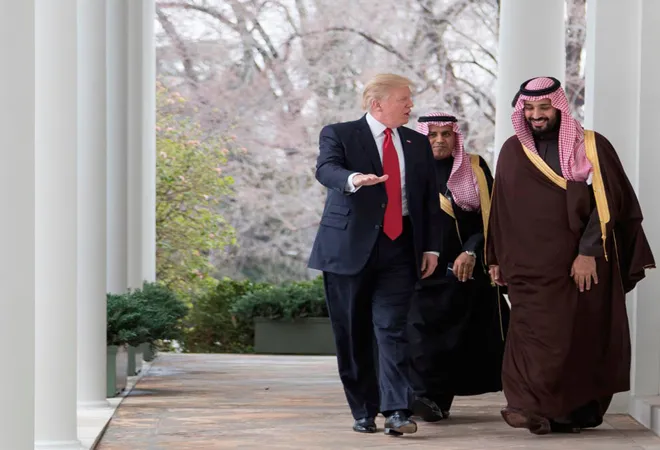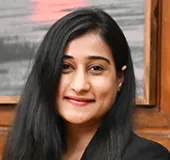-
CENTRES
Progammes & Centres
Location
Not only are the important regional players getting into a huddle to discuss the implications of President Trump’s actions, but are also re-calibrating their moves in view of this uncertainty. What Saudi Arabia and Iran do are most critical to the region.

Image Source: Shealah Craighead
President Donald Trump with Saudi Arabia’s Crown Prince Mohammed bin Salman bin Abdulaziz Al Saud, March 2017
In a sharp indication of his foreign policy priorities, President Trump began his first foreign tour by a highly publicised visit to Riyadh in May this year, where he addressed a gathering of over 50 leaders from the Islamic world, accused Iran being a ‘terror-sponsoring state’ and signed over a $100 billion worth of weapons deal with his hosts. Soon after, when the Gulf kingdoms fought among themselves and Qatar was ostracised from rest of the Gulf Cooperation Council (GCC), Trump was quick to take sides with the Saudi kingdom. To further assure the Saudi royalty, he tore up the nuclear deal with Iran that was painstakingly put together by his predecessor, with his European partners, along with Russia and China. Not to offend his hosts in Riyadh, Trump did not utter a word against the savage war that Saudi kingdom has been perpetrating on the hapless Yemenis who have been deprived of not only the semblance of a government but also the basic needs of survival for the last three years.
It is now clear that the war on Yemen, continued hostility with Iran and the recent tiff with Qatar are all policy diktats of the new Crown Prince Mohammad bin Salman who was also instrumental in pushing for a $110 billion arms acquisitions. It is significant to note that for the last three years, both Saudi Arabia and the UAE (United Arab Emirates) have been the top two arms importers in the world. Obviously, the wars in Syria and Yemen kept them fully occupied. But now that the war in Syria has ended with Assad firmly in saddle and the proxies of the Gulf kingdoms, the al-Nusra front and the Daeesh (Islamic State) totally routed, and the war in Yemen reaching no favourable conclusion, the Saudi kingdom is finding new ways to grasp the reality, perhaps with new friends.
It is significant to note that for the last three years, both Saudi Arabia and the UAE (United Arab Emirates) have been the top two arms importers in the world.
President Trump did his bit on Iran. After fretting and fuming on the last two occasions that he had to sign the quarterly certification that Iran has not violated the JCPOA, he finally refused to sign the ‘certification’, this October. With this, he signaled his disagreement with the evidence-based assessment of the IAEA that Iran is not in breach of the JCPOA signed between it and the P5+1.
But then the Congress has to act upon this ‘de-certification’ or denial of reality within 90 days and either impose sanctions on this ‘lie’ perpetrated by their President or accept the IAEA assessment and advise their President to continue to abide by the JCPOA. But then what happens to the US allies, to Iran and to the region. They have all moved on to adjust to the new reality and find ways to live without President Trump’s certification.
Britain, France and Germany refused to fall in line while Russia slammed the US President’s “aggressive and threatening rhetoric.” China quietly continued to do business with all three — the US, Saudi Arabia and Iran.
Not only are the important regional players getting into a huddle to discuss the implications of President Trump’s actions but are also re-calibrating their moves in view of this uncertainty. What Saudi Arabia and Iran do are most critical to the region. And both turned to Moscow.
Clearly Moscow had already emerged as the new power in the Middle East when its war-planes started bombing ISIS bases in Syria over a year ago, not for cosmetic effect as the American drones and helicopter gun-ships had done without in anyway degrading their capabilities. Russian intervention in Syria, supported by the Iranian Al-Quds force had changed the balance of power in favour of Assad, while they, in collaboration with the Kurdish Peshmerga, had dealt a deathly blow to the Islamic State in Iraq and Syria. All the regional powers, particularly the Gulf kingdoms, have now realised who the new Sheriff in town is.
Moscow had already emerged as the new power in the Middle East when its war-planes started bombing ISIS bases in Syria over a year ago, not for cosmetic effect as the American drones and helicopter gun-ships had done without in anyway degrading their capabilities.
When the Saudi King visited Moscow in October, this was the first ever such visit, for they had never strayed away from the American orbit of influence. Though he signed a paltry sum of $3 billion worth of arms deal (mainly to buy the famed Russian S-400 missile systems, that were supplied to Iran a few years ago), the king’s intention seemed more to align his core interest — oil supplies and its pricing with that of Russian interests. Not long ago, the Saudi kingdom had suppressed the oil prices, essentially to hurt both Russia and Iran, a move that was cheered by the US government though it hurt its own shale oil industry. Iran and Russia have not only come unscathed from the bottom of the barrel, as it were, but have actually come on top as the victors along with Syrian President Assad. This has completely undone the Saudi plans. It was time for a rethink. Earlier, the kingdom blamed President Obama for his unstinted support for the Iran nuclear deal, for his refusal to bomb Syrian military bases even against the use of chemical gas allegedly by Assad’s regime on his own citizens. So angry was the Saudi kingdom with the US President then that they refused to take the non-permanent seat in the UNSC, which they had won by election for the first time. That was in October 2013. From those days of throwing tamper tantrums, the kingdom has come a long way. They have now decided to cultivate new friends, instead of depending on unpredictable old allies. Having established a sound commercial and military relationship with China, Saudis now seek alliance with Moscow.
Earlier this month, on 1 November, President Putin visited Tehran and met President Rouhani and called on the Supreme Leader Ayotallah Khamanei. Three items appear to be on top of his agenda — fate of Syria and of President Assad in the post-war era (peace talks with the opposition, drawing up of de-escalation zones, elimination of the remaining jihadi terror groups, and a reliable successor to Assad, etc.); fate of the Iran nuclear deal in the era of Trump and how to boost the oil price. An unstated agenda may be that he could be carrying a message from King Salman to the Ayotallah. If there is one reliable mediator both sides trust, that is undoubtedly President Putin. He carries both weight and gravitas in the region. And has the military force to change reality on the ground. Key points that Trump sorely misses.
The views expressed above belong to the author(s). ORF research and analyses now available on Telegram! Click here to access our curated content — blogs, longforms and interviews.

Anjali Birla is an Indian Civil Services Officer(Batch 2020) working in the Ministry of Railways and has done her graduation in Political Science from Delhi ...
Read More +